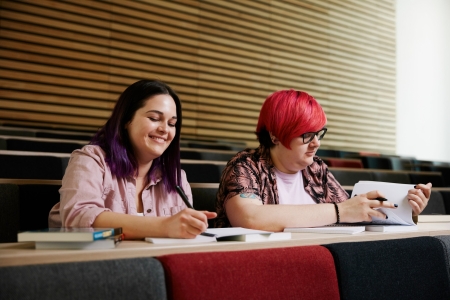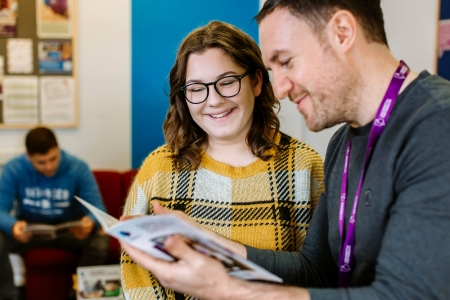
Sidebar navigation

Our guide to university words and terms
What different parts of the University and life on campus are called
When you start uni for the first time, you might come across words and terminology that you’ve not heard before.
This guide explains some of the common aspects of university life, which you’ll encounter during your time here.
Jump to:
- University and Academic life - including University departments, staff you might meet, and other students
- Your course - modules, credits, timetables, types of study, and more
- Assessments and feedback - including revising, marking, and grades
- Support at University - where to go for help

University and academic life
These are some of the main people and organisations you might meet as part of your University experience.
The University is split into five faculties which cover a broad range of subjects. Each faculty has within it different schools and departments focused on areas of expertise.

Our MyPort Hub is a help desk where you can ask staff about anything related to your course, such as timetables and assessments. They can also tell you about other support services at the University that can help you.
Your personal tutor is a University member of staff who will give you one-to-one advice and guidance throughout your degree. They work in your school or department, and can offer advice on your course and assessments.
They can also help you find support services for any personal issues you may experience, and provide a reference for job applications.
Lecturers are academic members of staff who teach and assess you. Senior lecturers are sometimes called an Associate Professor or Professor.
As well as teaching students, lecturers often do research in their area of expertise, publish journal articles, and peer review other people’s research.
A member of staff who is involved in teaching and/or research is also often called "an academic".
You may have technicians in your faculty that have the skills to help you in practical lab classes and workshops. They can often help with accessing and using specialist equipment, maintaining machines and materials, and otherwise helping you with your research.
Undergraduate students - are students who usually are completing their first degree, such as a Bachelor of Arts (BA) or Bachelor of Science (BSc) degree
Postgraduate students - are students who have completed an undergraduate degree and are studying at an advanced level. There are two types of postgraduate students:
- Taught students who will usually be studying for a master’s degree, and
- Research students who will usually be studying for a PhD.
Alumni - are former students of the University who have completed their course and graduated.

Your course
While you study for your degree, you'll become familiar with how your learning is structured, and different types of study.
A unit of learning. Each module has its own goals for what you should learn, and some kind of assessment that you have to pass.
Core modules - are those that all students on a course have to take.
Modules can be worth different credits depending on their size and how much they contribute to your overall grade.
On full-time undergraduate courses, you usually study for 120 credits each year. A three year degree usually is made up of 360 credits in total.
Your timetable is a personalised schedule telling you when and where your classes and exams will take place.
- Teaching block - There are usually two teaching blocks in each academic year - Teaching Block 1 from September - January, and Teaching Block 2 from January to May. The dates of teaching blocks are confirmed in the key dates for each academic year. Each teaching block will have different modules and assessments.
There are different types of study you might experience while at uni. Most of your learning will be in person, but some may be online.
- Lectures - a teaching session run by a lecturer for a large group of students. They will often speak and present on a topic in a lecture theatre, or sometimes online. It's a good idea to take a laptop or a notepad and pen to make your notes, and to put your phone on silent during your class. Lectures may be recorded for you to watch back later - ask your lecturer for more information.
- Seminars and tutorials - You might also have some teaching sessions in smaller groups, called seminars or tutorials. Seminars are discussion-based sessions led by your lecturer. They will introduce a topic and guide the discussion around it, but you and your fellow students do most of the talking. The discussion could be based on an article your lecturer has asked you to read before the seminar, an important topic in your degree, or something else.
- Lab work and practical classes - Your degree may include practical classes depending on your course subject. You'll put your theoretical work into practice and develop your practical skills, communication and problem solving during these sessions. Practical classes sometimes take place in labs or on computers, or involve clinical practice or fieldwork.
- Group work - Being able to work well in a group is a skill that many graduate employers look for, and group assignments are an important way to show your ability to work with others. Groups are usually set up by your lecturer and can differ in size.
- Independent study - Most of your time at university will be spent studying independently. Independent study happens outside of your timetabled ‘contact’ activities (lectures, seminars, tutorials and practicals). This will include any reading or research when you’re preparing for a lecture, writing an essay, or taking part in a group activity.
There are a range of digital tools that you'll use at uni to help with your learning. This includes Moodle, a virtual learning environment where you’ll find your course materials, activities and discussion forums.
You’re expected to attend all teaching sessions on your course. Record your attendance in person by swiping your Student Card on the card readers at the teaching room, or online by logging in on Moodle.
Some courses require students to spend time in a workplace related to their subject, which will be assessed.
Other courses offer placements as an optional learning opportunity - for example spending a year with an employer in an industry related to your course.

Assessments and feedback
When it comes to testing what you've learned, you'll be expected to prepare for and complete assessments and get feedback on how you've done.
Assessments are how you’re tested on what you’ve learned on your module. It could take the form of exams, presentations, group projects, or exercises.
The assessments are set and marked by your teachers. You’ll be told what type and number of assessments you’ll be completing at the start of your course, and they’ll take place during the university assessments periods. Assessments can be formative (for feedback and skill improvement only) or summative (contribute towards your final grade).
Assessment weighting is the percentage contribution that an assessment makes to your overall module grade.
Going over your module content is essential to prepare for your exams and assessments. If you’re not sure where to start, we have plenty of revision tips for ideas.
Referencing is how you show what you’ve read and what has influenced your own thoughts when working on your assessments. There’s lots of referencing help available at the library to help you get the format right.
A lecturer from your course will mark your assessment. Where possible, assessments are marked anonymously, meaning they won’t know your name.
A second lecturer looks through a selection of work from the course independently. Their job is to review the work and give their own marks - so that your department can check that they’ve been marked fairly.
Plagiarism means presenting work or ideas from another source as your own without full acknowledgment. Written assessments will also be checked for plagiarism, to make sure that it’s truly your own work. Your assessment will usually be checked through TurnItIn, software that checks your work against others. The Originality Report will indicate how similar your work is to other people’s writing.
When the marker reviews your report and your assessment, and if they feel large amounts match existing writing or others’ work, you may be investigated for plagiarism.
Usually your mark will be a number, reflecting how well you’ve met the standards or criteria. The numbers match up to overall degree classification:
- A “First” is given for work that’s very good, and has received a mark of 70 or higher
- A “2.1” (two-one) is given for good work that has received a mark of between 60-69
- A “2.2” (two-two) is given for work that has received a mark of between 50-59
- A “Third” is given for work that receives a mark of between 40-49
Work that receives a mark below 40 is considered a fail.
Sometimes you may have other options, like referring or deferring your modules - you can find more information on understanding your results online.
Along with a mark you’ll also receive feedback to help explain where your work is strongest and how any improvements could be made going forward.
You could receive feedback in informal conversations in your classes and with your tutors. Or you will often receive written feedback on drafts of work, from mock exams or group work.
You should discuss your feedback with your module coordinator if you have any questions about how to improve your work.
Feedback on formal assignments will be available within 20 working days of your submission deadline (usually about 4 weeks, though this can be longer if it includes University closures).
Sometimes short term issues might come up and affect your ability to complete your assessment - like illness or bereavement. A process called extenuating circumstances (often called “EC” or “ECF”) is available for students to apply for an extension or deferral to complete the assessment. You must check that you meet the criteria, and supply evidence of the issue affecting you.

Support at University
If you need advice or support at any time while at uni, there’s lots of different sources of help for you.
Generally University services and offices are open 8.30am to 5.00pm Monday to Thursday, and from 8.30am to 4.00pm on Friday, though some vary. Most services are closed during national bank holidays and have more limited opening hours outside of term time. You can look up holiday opening times on MyPort.
You can email University staff outside of office opening hours, but you’ll probably not receive a reply until the office is open again - unless you’re contacting an emergency or out of hours service.
The Students’ Union (UPSU) represents Portsmouth students like you and offers a range of services and activities to make your uni experience better. This includes:
- Sports clubs and student groups - At Portsmouth there are more than 120 student sports clubs and groups run by students. Societies can be social, skills or hobbies based, subject or social action based. Here you can meet like-minded people with similar interests ranging from gospel choir, gaming, to beer pong.
- Freshers' Fayre - A ‘fresher’ is a student who has just started their first year at a university. At Freshers Fayre you can meet and sign up to different student groups, services and local businesses, and get some free stuff! The official Portsmouth Freshers’ Fayre usually takes place during induction week and is organised by the Students’ Union, so please check before you buy or give your data to avoid scammers and fake events.
- Advice Service - The Union’s Advice Service offers free, confidential, impartial and non-judgemental support. They can help you understand and navigate the University’s policies and procedures.
Every year students vote for Elected Officers to represent their views and voices with the University.
Your course will have students who are elected by you to represent your views about your particular course. If you have concerns or positive feedback about your course, you can talk to your Course Reps who will raise them with University staff for you. Your course reps will usually introduce themselves to you at the start of your course, and find their names on Moodle. Speak to them in person or give feedback on your course via START.
The University Library is a central space for study, research and support. From solo studying to group work and research projects, the library has space and resources for study and work of all kinds. Services at our library include:
- Librarians to help you to find journal articles, access books and search for literature.
- Referencing is how you show what you’ve read and what has influenced your own thoughts - and referencing help is available at the library.
-
E-books and e-journals are electronic versions of publications that you can use through any computer.
-
Interlibrary loans let you borrow books from other libraries across the country
Get help with accessing university computers, borrowing a laptop, logging on with your own devices and more through our IT team. The team uses a ‘Service Desk’ system to keep track of and reply to your requests - such as reporting a fault.
If you need any help with aspects of your study, like improving your essay writing, language or statistics, there’s support available for you:
- Additional Support and Disability Advice Centre (ASDAC) supports students who have a disability or need additional support with their studies. This can include helping set up special adjustments for your learning and assessments.
- Academic Skills Unit offers one to one help with developing your writing and learning skills to make you a better student.
- In-sessional English courses are available if English isn’t your first language, to develop your academic language and communication.
- Maths Cafe helps you develop your mathematics and statistics understanding for your course - including daily drop in sessions and help from tutors.
- Support tutors - are available in your faculty to help you learn and develop the key skills for your course.
The Student Wellbeing Service offers free counselling sessions and resources to help manage your mental health.
Get the job you want when you graduate by using the Careers and Employability Service. You can get help with applying for jobs such as help with your CV, mock interviews, practice assessment centres and more. They can also help with finding placements, internships, volunteering opportunities, further study or starting up a business.



